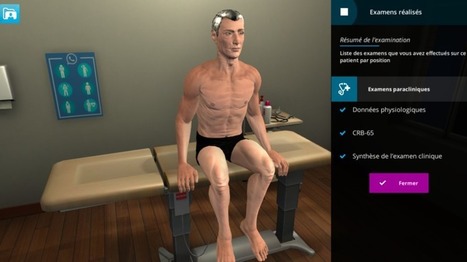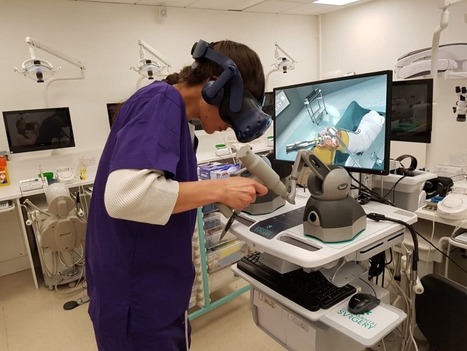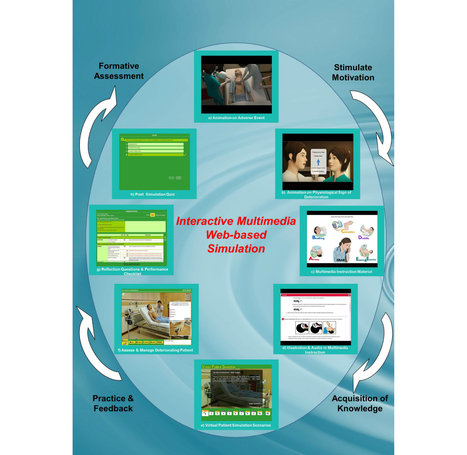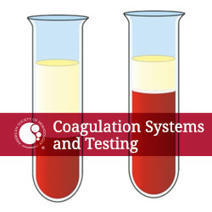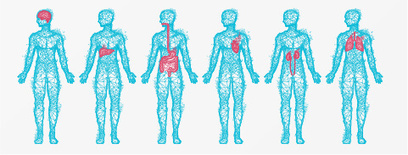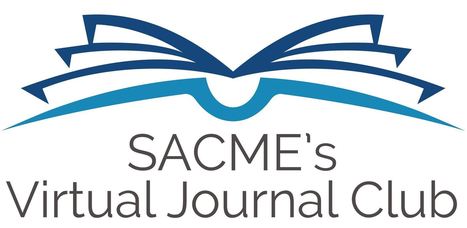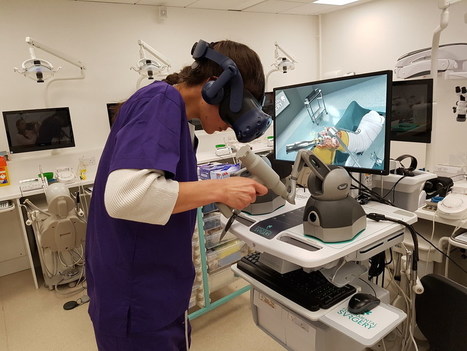 Your new post is loading...
 Your new post is loading...

|
Scooped by
Gilbert C FAURE
September 22, 2023 10:19 AM
|
Empathy Suits are an excellent way to have clinical students become immersed in a representation of the patient experience. Designed to create physical restrictions on the wearer, a restrictive empathy suit will simulate conditions such as joint restricting conditions, visual impairment, reach...

|
Scooped by
Gilbert C FAURE
December 20, 2020 2:04 PM
|
Introduction Traditional learning in medical education is predominantly based on didactic in-person interactions with teachers, peers and patients. In residency training, besides didactic teaching, learning includes various formal and work-based formats including bedside rounds, out-patient clinics, resident-led seminars and research-based learning. Pandemics like the coronavirus disease 2019 (COVID-19) have caused significant disruption in this learning model as social distancing, team segregation and reorganization of workflow protocols take effect. This has necessitated several changes in education and training for students, residents and clinicians. Although the concept of e-learning has existed for several years, the COVID-19 pandemic has pushed digital education to the forefront of medical education. The severe acute respiratory syndrome (SARS) outbreak in 2003 necessitated the closure of medical schools and resulted in barring of medical students from patient contact. The education of residents and fellows was also severely affected in the impacted countries. The resultant severe disruption of medical education sensitized educators and policymakers to the fact that education of students and residents must continue in the face of such pandemics with all necessary safety measures [1,2]. Thus, innovative approaches such as video/audio recordings, mannequin simulators, virtual patients, webcasting and online chatrooms were successfully adopted by training programs during the outbreak. High stakes entrance and exit exams were also shifted to telephone-based or digital modules. The COVID-19 pandemic has already caused unprecedented social and economic devastation across the globe and continues to evolve. Healthcare systems are being severely disrupted in many countries and the future course is unpredictable [3]. As September 12, 2020, more than 28 million cases have been diagnosed worldwide with over 0.9 million deaths (Johns Hopkins tracker, https://coronavirus.jhu.edu/map.html). The impact on medical education, residency training and continuing medical education (CME) for providers is expected to last for a long and unpredictable duration in many countries. The ever-increasing globalization and high probability of future pandemics mandates measures and contingency plans to mitigate the impact of future pandemics on medical education. Impact on Oncology Care, Research, Education and Oncology Conferences: Need for Virtual Platform The rapid spread of COVID-19 has profoundly impacted cancer care globally. Cancer patients face the dual risks of acquiring the infection with a potentially higher probability of severe morbidity and mortality from COVID-19 and the adverse impact of delaying anti-cancer therapies [4]. Strict lockdowns, lack of public transport facilities and containment measures also preclude patients from access to care [5]. Measures to prevent the transmission including limiting face-to-face consults, work flow modifications, delaying surgical procedures, re-distribution of oncology workforce towards other areas for pandemic control can all result in significant delays in cancer diagnosis and treatment which will ultimately impact patient outcomes. Cancer research has suffered a significant slowdown due to the current pandemic and the impact is likely to continue for a long term [6]. Recruitment of new patients to ongoing trials have been hit due to various factors like patient reluctance, change in hospital policies into more convenient and less toxic treatment regimens and logistic reasons. Traditional teaching in oncology is predominantly based on didactic lectures, resident-led seminars, bedside clinics, out-patient interactions and conferences with the goal of developing skills and expertise for a safe and effective workplace practice. As physical distancing norms, segregation and re-organization of teams take effect, education and training activities are likely to be severely disrupted. Infection among healthcare workers, assignment of alternative clinical responsibilities for faculty and residents, cancellation of ongoing academic programs and rescheduling or cancellation of examinations are all likely to take a toll on training and education. The unprecedented situation warrants a rapid adaptation and transition towards leveraging technology to maintain education and assessment of trainees and providers. Most global and national meetings of various anti-cancer organizations were either re-scheduled, cancelled or changed to a virtual platform. Predominant among these were the annual meetings of the American Association of Cancer Research (AACR) which was rescheduled and changed to a virtual format and the American Society of Clinical Oncology (ASCO) which was revised to a virtual only format. The ASCO 2020 Annual Meeting was conducted in an entirely virtual format with practice changing data presented from May 29–31, 2020 and a virtual education program conducted between August 8–10, 2020. There was no registration fee for members and the fee for non-members was considerably less when compared to those of the previous meetings. The meeting had more than forty thousand participants and practice changing data and research findings from many trials and studies were presented. The virtual platform also introduced a feature for virtual networking including one-on-one chatting or video calls with other attendees, ASCO staff or industry representatives to recreate the onsite meeting experience. Registered participants also have the option to view the sessions or content at their convenience. Similarly, the Annual Meetings of European Society of Medical Oncology (ESMO) and the American Society of Radiation Oncology (ASTRO) will be conducted in a virtual format in 2020. These are dramatic changes for organizers, presenters and attendees who are accustomed to traditional in-person conferences. Technological advances in video-conferencing and telecommunications have made these virtual meetings feasible and accessible globally. Advantages of the virtual model include significant savings of time, money and effort especially in terms of travel, accommodation and rescheduling of clinical duties. The environmental benefits of reduced greenhouse emissions from travel and hospitality can be huge. The pandemic may thus drastically alter the way scientific meetings are conducted in the future [7,8]. Currently, various guidelines have been proposed to assist organizers as future events are being converted to virtual or hybrid (on-site and virtual) formats [9,10]. While most of the “usual business” of an onsite meeting can be shifted to the virtual platform, it would still be insufficient to recapitulate the entire experience given the missing expressions and emotions of interpersonal communication. Live presentations at these meetings represent a major avenue for professional development and career advancement for fellows and junior faculty and a virtual format may not replace this experience. The virtual formats also risk potential disruptions due to technical or connectivity issues. Current Status of E-Learning in Oncology: Modifications and Adaptations in Residency Training during Pandemics Technological innovations over the last two decades have enabled e-learning in many aspects of medical education. Complementary teaching aids such as virtual patients, video vignettes, e-learning modules, virtual three-dimensional (3D) anatomy modules and simulators are already being incorporated into medical education. These tools are highly useful aids during pandemics like the COVID-19 where they can enable uninterrupted remote learning in the face of ongoing challenges. Video-conferencing and online meeting software such as Zoom (Zoom Video Communications, San Jose, CA, USA), Webex (Cisco Webex, Milpitas, CA, USA), Skype (Skype Technologies, Palo Alto, CA, USA), GoToMeeting (LogMeIn Inc., Boston, MA, USA), Teams (Microsoft Corporation, Redmond, WA, USA), Google Meet (Google, Mountain View, CA, USA), etc., with features like screen sharing, chat and video based interactions have made didactic teaching possible in a virtual classroom format. Feedback from residents and fellows has demonstrated a high degree of satisfaction and even a preference for these online teaching tools compared to traditional classroom learning. Students have reported a higher comfort less and lower inhibition and senior intimidation to interacting remotely with faculty and peers when compared to in-person teaching. In a recent study 88% of trainees felt more comfortable raising questions through videoconferencing compared to traditional didactics [11]. Tumour boards form an important component of learning and multi-disciplinary co-ordination in oncology. As tumour board discussions also transitioned to virtual formats, feedback from stakeholders suggested increasing satisfaction and a preference to continue the virtual format beyond the pandemic. The virtual model has the advantage of enhanced participation from trainees in rotation duties, those in quarantine and allows multi-centre collaboration [12]. Experience from some centres also demonstrated that e-learning, online collaborations and working during the pandemic also provided the opportunity for residents to revamp their basic medical skills and obtain important lessons in resilience, teamwork and empathy [13]. A systematic review showed a higher or similar effectiveness for e-learning compared to traditional interventions in surgical training [14]. Similarly, a long-term review of e-learning for students and resident education in otolaryngology reported higher satisfaction and significantly enhanced objective knowledge compared to traditional learning [15]. The “flipped classroom” model of blended learning incorporates interactive online lectures with discussions, under the guidance of a mentor. The study material in lecture format (audio/video) is usually shared with the participants prior to the online class so that the actual class assumes a more interactive format shifting the instruction to a learner-centric model. These formats can make learning more self-directed, less didactic and studies have shown that it is received more enthusiastically by students [16]. A meta-analysis of 28 studies showed an overall significant effect in favor of flipped classrooms over traditional classrooms for health professions education [17]. It also showed that incorporation of a quiz at the beginning of the class made the learning more effective. For radiation oncology residents, better utilisation and practising on virtual environments for contouring and radiotherapy planning and evaluation can be very useful considering the shift in their work load. The ASTRO EduCase, Radiotherap-e (eIntegrity e-Learning, Hertfordshire, UK), eContour, FALCON (Fellowship in Anatomic Delineation and Contouring) by the European Society for Radiotherapy and Oncology, etc., are a few examples of such virtual learning platform. Highly Interactive Technology-Based Solutions in Medical Education With advances in telecommunications, smartphones, point of care tools, decision making apps, mobile-based medical calculators are now in common usage by residents, fellows and providers. These devices provide real-time point of care information in bite-sized portions that can support learning and clinical care [18,19]. Various apps for cancer diagnosis, clinical decision support, symptom assessment, pain management, chemotherapy planning, dose calculations, drug interactions and research data collection are currently in use in oncology clinics [20]. Virtual reality (VR) simulation refers to the creation of scenarios as complex, computer-generated images. The virtual display simulates the real world and user interactions within that simulated (virtual) world. VR is being increasingly incorporated into medical education especially training in surgical and procedural skills and can prove to be a highly useful tool for learning complex procedures in cancer surgery and robotic assisted procedures [21]. Use of high-fidelity manikins with many interactive features including display of physical signs is also being adopted increasingly in medical and surgical training [22]. Wearable technologies like Google Glass can provide real-time, hands-free dynamic learning in the clinic and on-the-go [23,24]. Online game-based learning offers another engaging and interactive format to enhance learning objectives and has been effectively used to improve clinical and surgical skills. It focuses on problem solving over memorizing content [25,26]. Advantages of E-Learning in Oncology A virtual learning platform can tremendously impact education of students and residents both during the pandemic and beyond as it broadens the horizons of continued education, interactive learning and collaboration. It will be extremely useful for faculty and trainees in any situation where physical presence is not feasible and enable learning from otherwise difficult to access experts. It can serve as a cost-effective solution for low resource settings. Digital solutions allow recording, cloud-based storage and on-demand retrieval [27]. Online learning offers the flexibility to adapt the format and content to make education more learner-centric. It makes learning active rather than passive and offers the possibility of multi-institute and even global collaborations including sharing of educational resources among organizations [28]. Studies show that “interactivity” in education is highly valued by trainees. An online learning module which offers the ability to meaningfully interact with faculty and peers and the opportunity to obtain ongoing constructive feedback is highly desirable and sustainable [29]. Pre and post session quizzes can effectively promote learner engagement and assess learning outcomes [18]. Team‐based learning is an interactive teaching method that is learner centred and instructor directed. Post-lecture discussions with spaced repetitions of content in an easily digestible format can be highly effective [30]. Debate style teaching can be highly engaging for participants while providing clarity on controversial topics and multiple perspectives on clinical problems [31]. Most oncology conferences include debate-based sessions and post session audience polls which promote active participation and are effective learning opportunities. Real-time polls, chats and break-out group discussions can be highly engaging and serve to reinforce concepts. Scheduling and tracking apps can assist faculty and trainees in planning their routines and assessing their progress. Technological solutions can also be used for ongoing mentoring of trainees and fellows and providing mental health services for physicians and trainees. E-learning has the distinct potential to revolutionize education in remote areas and community-based practices. Online assessments, practice assignments and simulation of procedures can ensure uninterrupted learning. Social media can be a powerful tool for the current and future generations to maintain ongoing education [32,33]. Digital technology can also facilitate research-based education for trainees by utilizing telemedicine to monitor patients on research protocols and video-conferencing for data monitoring and committee meetings. Online platform was successfully utilised by many academic institutes for final exit exams for the oncology residents [34]. Transitioning Towards a New Era in Residency Training and Provider Education It is important to ensure that all potential users are familiarized with how to optimally utilize the online application. All users should also learn the basic etiquette for online conferencing including muting their microphones when not speaking, refrain from interrupting another speaker and optimal use of video and background blur for a more interactive experience. Users should also learn how to effectively moderate a session and troubleshoot minor technical issues [35]. Kotter’s Change Management Model (https://www.kotterinc.com/8-steps-process-for-leading-change/) offers insights into transitioning into, adopting and incorporating a new paradigm into routine practice [28]. A robust and sustainable modification to educational approaches is the need of the hour. Academic medical centers should prepare themselves to recognize new threats that can potentially disrupt learning. A proactive response is required that incorporates a risk-adapted approach with restructuring of academic programs to technology enabled formats without compromising continuity and quality [36]. Telemedicine can be effectively utilized for various aspects of cancer care and education [37]. Challenges of E-Learning Major challenges include availability of infrastructure and willingness of the stakeholders to adopt the technology. Lack of time, technological skills and confidence can be a significant deterrent for teaching faculty [38,39]. E-learning can also be challenging in resource limited settings [40]. A negative attitude towards change and poor institutional support can preclude a successful implementation [41]. It is therefore imperative that these issues are addressed to effectively transition towards technology based learning [42]. Emotional engagement with the audience can be a challenge as facial expressions, body language and visual cues which enable real-time interpretation of participant engagement and understanding may be lacking. Besides the lack of a friendly arm and psychological support during these times of isolation and anxiety can negatively impact learning objectives. It has also been shown that distractions and disruptions can be more frequent during online learning compared to traditional classroom teaching [43,44]. Fatigue of trainees could also become a significant barrier to effective learning especially when they’re expected to fulfil their increased work responsibilities along with completing their learning tasks. It is also undeniable that online learning cannot replace the requirement for procedural and experiential learning although simulation [45], virtual reality, tele-consults and virtual patients can circumvent these challenges to some extent. Future Directions A traditional face to face teaching and learning method is undoubtedly irreplaceable. But the current pandemic has steered residency training towards technologically driven learning and will provide direction and information on best practices to maintain and enhance training through these difficult times and beyond. It has provided the opportunity to leverage technology and incorporate concepts of pedagogy to the training of residents and physicians. Academic Institutes and professional societies should now focus on creating a structured and focused content to design pedagogically informed online courses which are interactive and learner-centric. The crisis can provide an impetus towards multi-institute and global collaboration in oncology training [28,46]. Oncology societies like ASCO and ESMO, with their large international membership and a vast repertoire of educational resources, can take the lead in initiating and facilitating innovative approaches in learning. Over the past decade ASCO has greatly expanded its educational resources and is continuously working towards enhancing the learning experience for its members [47]. The ASCO eLearning catalogue features an increasing suite of educational resources designed to address learning needs of oncology fellows and providers (https://elearning.asco.org/). The ESMO also provides a vast variety of educational content through the OncologyPRO section on its website (https://oncologypro.esmo.org). Both these professional societies also have vast amount of COVID-19 related resources which are continuously updated to provide the latest updated information on oncology care during the pandemic [48,49]. Future educational initiatives should leverage advances in knowledge and technology to create innovative solutions based on current concepts in cognitive learning theory. It is important to promote student engagement and minimize distraction. Interactivity and corrective feedback should be incorporated. An ongoing mechanism to access impact and effectiveness of the system will inform improvement to a dynamic and flexible system. The module should analyse learning outcomes utilizing tools for formative and summative assessments [34]. Academic institutes need to systematically plan and organize initiatives for blended learning. Digital platforms can also be effectively utilized for objective structured teaching examination (OSTE) for a transparent assessment of teaching faculty and support career and professional development initiatives [50]. Conclusion E-learning ensures a safe environment to maintain education during a pandemic. The enhanced audio-visual tools can be effectively utilized to engage learners, promote interactivity, provide feedback and assess progress. A dynamic and flexible model ensures active learning with individually tailored instruction in easily digestible bits. An effective system should also incorporate spaced repetition, practice assignments and objective assessment. Stakeholders should work towards standardizing e-learning into routine educational modules and create a system of credibility and accountability. The long-term social, environmental and professional advantages of adopting e-learning at the Institute and global level are potentially enormous. Moving forward, technology enabled learning is well poised to become an integral part of education in oncology.

|
Scooped by
Gilbert C FAURE
November 29, 2020 4:06 AM
|
One of the most important steps in curriculum development is the introduction of simulation- based medical teaching and learning. Simulation is a generic term that refers to an artificial representation of a real world process to achieve educational goals ...

|
Scooped by
Gilbert C FAURE
March 10, 2020 2:19 PM
|
Plateforme de simulation numérique pour la formation en santé

|
Scooped by
Gilbert C FAURE
February 19, 2020 7:57 AM
|
A systematic review to compare the effectiveness of face-to-face versus online (including blended
learning) delivery of CME/CPD for healthcare practitioners (HCPs).

|
Scooped by
Gilbert C FAURE
February 18, 2020 4:37 AM
|
Usually, when you think of virtual reality, you likely consider gaming or a distant image of what the future will look like. Interestingly, virtual reality seems to be making its way into healthcare. This opens up some truly amazing possibilities and innovations… and that’s just in my mind alone.

|
Scooped by
Gilbert C FAURE
January 19, 2020 3:56 AM
|
The UK firm’s VR technology simulates operations to enable surgeons to practice their skills.

|
Scooped by
Gilbert C FAURE
December 21, 2019 11:20 AM
|
“The AAOS strives to ensure that educational programs designed for orthopaedic surgeons meet the criteria of the accreditation requirements of the Accreditation Council for Continuing Medical Education,” said Anna Salt Troise, Chief Education Strategist, AAOS. “For the first time, we’re expanding these programs into the VR space to help our members and residents experience and navigate the same visuals, sounds and feelings they would during a real surgical procedure while obtaining CME credits. The Fundamental Surgery TKA simulation does just that by offering both an exciting training opportunity, as well as a look at how VR training is guiding the future.” “Educational sources of learning and member development, such as the AAOS, provide significant value to surgeons in practice and training through quality assured courses, online content and now with our Haptic VR simulations.” said Peter Rainger, Chief Learning Officer of Fundamental VR. “We’re truly delighted to have been awarded accreditation and will continue to work with the AAOS on our library of orthopaedic simulations, ensuring they meet the stringent educational quality criteria, and allowing us to offer training that is valuable for trainees as well as attending surgeons.” About Fundamental Surgery Named as one of the best inventions of 2018 by Time magazine, the Fundamental Surgery platform combines virtual reality (VR) with cutting-edge haptics to create a scalable ‘flight simulator’ experience for surgeons. They’ll feel the movement and interaction of tissue, muscle and bone which reflects the experience in a procedure, and is proven to support knowledge and surgical skills transfer. Additionally the use of haptics enables highly accurate data capture and subsequent analysis. Fundamental Surgery has a library of tools and tissue variants that mimic real life sensations that have been calibrated by a leading team of surgeons and KOLs. Fundamental Surgery is being developed and deployed in partnership with hospitals and medical device companies in Orthopedics, Ophthalmology, Vascular, Cardiothoracic, General and Neurosurgery. For further information about Fundamental Surgery, please visit: www.fundamentalsurgery.com. About the AAOS With more than 39,000 members, the American Academy of Orthopaedic Surgeons is the world’s largest medical association of musculoskeletal specialists. The AAOS is the trusted leader in advancing musculoskeletal health. It provides the highest quality, most comprehensive education to help orthopaedic surgeons and allied health professionals at every career level best treat patients in their daily practices. The AAOS is the source for information on bone and joint conditions, treatments and related musculoskeletal health care issues and it leads the health care discussion on advancing quality. For more information about the AAOS, visit AAOS.org or follow the AAOS on Facebook, Twitter and Instagram. Fundamental Surgery Contact: Ian Twinn / Tandem Marketing Communications iantwinn@tandemcomms.com | (917) 306-7270 SOURCE: Fundamental Surgery, PR Newswire, 19th December 2019 Related Links https://www.fundamentalsurgery.com

|
Scooped by
Gilbert C FAURE
December 11, 2019 8:26 AM
|
Prix de l’innovation des prestataires de DPC agréés par le Collège royal anciens récipiendaires Les lauréats du Prix d’innovation de 2019 sont : Académie CHUM L’outil EMERGO: la simulation de table comme approche pédagogique De gauche à droite: Dr Khalid Azzam, Mme Nathalie Soucy, et M. Bernard Lebeuf L’Association canadienne de protection médicale (ACPM) Programme d’engagement envers le changement De gauche à droite: Mme Karen Lemay, Mme Elisabeth Normand, et Mme Tunde Gondocz Fédération des médecins spécialistes du Québec (FMSQ) Repenser la formule de notre congrès annuel - Répondre aux besoins des membres en s’associant à cinq centres de simulation provinciaux De gauche à droite:M. Martin Tremblay, Mme Marie-Josée Bouchard, Dr Sam Daniel, Mme Beatriz Merlos, Mme Maryse Bouthat, and Dr Khalid Azzam Les lauréats du Prix d’innovation de 2018: Canadian Association of Emergency Physicians “Emergency Medicine Review” De gauche à droite: Dr Mark Mensour and Dr Mark Awuku Queen’s University, Office of Professional Development & Educational Scholarship “Using Faculty Development to Facilitate Transformative Change” De gauche à droite: Dr. Richard van Wylick and Dr. Mark Awuku The University of Toronto, Faculty of Medicine, Continuing Professional Development “Certificate Program in CPD Foundations” De gauche à droite: Dr. Suzan Schneeweiss and Dr. Mark Awuku Les lauréats du Prix d’innovation de 2017: Dalhousie University, Continuing Professional Development “Teaching is Where It’s AT” Program De gauche à droite: Dre Connie LeBlanc et Dr Kenneth Harris Fédération des médecins spécialistes du Québec MEDUSE – Learning Management System De gauche à droite: Dr Sam Daniel et Dr Kenneth Harris University of Toronto, Continuing Professional Development Test-Enhanced Continuing Education De gauche à droite: Dre Suzan Schneeweiss et Dr Kenneth Harris Les lauréats des Prix d’innovation de 2016: Canadian Anesthesiologists Society «Improving Education Delivery and Optimizing Credit: The Framework for CBD for CPD» Canadian Association of Gastroenterology «The Colonoscopy Skills Improvement Course (CSI)» CPD Collaborative of Ontario Faculties of Medicine (McMaster University, Northern Ontario School of Medicine, Queen’s University, University of Ottawa, University of Toronto, University of Western Ontario) «CPD Collaborative Model demonstrated though Improving and Driving Excellence Across Sectors (IDEAS): Introductory 2-Day Program» De gauche à droite: Dr. Khalid Azzam, Dr. Suzan Schneeweiss, Dr. Paul Hendry, Dr. Kevin Waschke, Ms. Kate Kittner, Dr. Karen Smith, Dr. Susan O'Leary, Dr. Connie Switzer. Les lauréats des Prix d’innovation de 2015 Association of Medical Microbiology and Infectious Disease Canada AMMI Canada CPD Educational Needs Assessment A Novel Approach to Determine Unperceived Educational Needs De gauche à droite: Dre Sarah Forgie, Mme Riccarda Galioto, Dre Shelley Ross University of Manitoba Faculty of Health Sciences Oral-Systemic Health Day De gauche à droite: Dr Jeff Sisley, Mme Tanya Walsh, Mme Casey Hein, Dre Connie Switzer University of Toronto Continuing Professional Development Continuing Education Leadership Program (CELP) De gauche à droite: Mme Jane Tipping, Dre Suzan Schneeweiss

|
Scooped by
Gilbert C FAURE
November 23, 2018 2:34 PM
|
Receive an automatic 15% off at checkout when purchasing any of our best-selling products―the sale is valid through November 26. Act now! ACE: Anesthesiology Continuing Education Refresh your knowledge of anesthesiology fundamentals and stay informed on changing technology and guidelines. List Price: $830 $705.50 Member Price: $360 $306.00 SEE: Self-Education and Evaluation Stay “in the know” on changes in the industry, backed by today’s literature and apply them to your daily practice. List Price: $830 $705.50 Member Price: $360 $306.00 Fundamentals of Patient Safety 2018 Apply patient safety concepts to the practice of anesthesiology by participating in this interactive, online CME course. Patient safety principles are reinforced with anesthesia-specific scenarios and examples. List Price: $160.00 $136.00 Member Price: $120.00 $102.00 Anesthesia SimSTAT - Trauma Test how well you manage an accident victim through ASA and CAE Healthcare’s virtual operating room and receive instant performance feedback and scoring. List Price: $350.00 $297.50 Member Price: $250.00 $212.50 Anesthesia SimSTAT - Appendectomy Provide intraoperative care for patients undergoing laparoscopic surgery for acute appendicitis through an innovative, screen-based simulation experience. List Price: $350.00 $297.50 Member Price: $250.00 $212.50 Anesthesia SimSTAT - Robotic Surgery Provide intraoperative care for patients with complex health problems undergoing robotic surgical procedures through an innovative, screen-based simulation experience. List Price: $350.00 $297.50 Member Price: $250.00 $212.50 Safe Sedation Training - Moderate Sedation Non-anesthesiologist physicians and care team members will discover critical information and best-practice guidance needed to safely care for patients undergoing routine moderate sedation. List Price: $199.00 $199.00 Safe Sedation Training - Deep Sedation Complete the three comprehensive SSTdeep components to master the skills needed to keep patients safe while administering sedation. This product was developed based on ASA guidelines and designed for non-anesthesiologist physicians seeking privileges for deep sedation. List Price: $3,399.00 $2,889.15

|
Scooped by
Gilbert C FAURE
October 2, 2016 3:23 AM
|
How would you investigate a patient's persistent cough? Complete the simulation and earn #CME… https://t.co/hDlGEMbCZ1

|
Scooped by
Gilbert C FAURE
April 17, 2015 3:55 PM
|
Background: Immersive patient simulators (IPSs) combine the simulation of virtual patients with a three-dimensional (3D) environment and, thus, allow an illusionary immersion into a synthetic world, similar to computer games.

|
Scooped by
Gilbert C FAURE
January 21, 2015 2:01 PM
|
Background: Web-based learning is becoming an increasingly important instructional tool in nursing education.
|

|
Scooped by
Gilbert C FAURE
August 22, 2022 5:36 AM
|
CATALOG The following ASH Academy On Demand offerings have been developed by subject-matter experts to meet your professional education needs. Activites include continuing medical education (CME) and maintenance of certification (MOC) activities and resources to support your continuous professional development by offering various types of credit. Categories Live Event Access evaluation and request certificates for ASH live events. Online Courses Join ASH educational programs from any location. Webcasts View recorded presentation from live ASH events. Simulation Case-based learning to improve your medical knowledge. Question-Based Learning Test your knowledge with multiple-choice quizzes and cases. Webinar Online educational seminar on leading topics in the field. Self-Assessment Self-paced programs on malignant and non-malignant hematology topics. Image Challenge Interactive quizzes that test readers' knowledge of different hematologic or related conditions. BROWSE FULL CATALOG Featured Courses BHC: Coagulation Systems BHC: Sickle Cell Disease

|
Scooped by
Gilbert C FAURE
December 14, 2020 8:28 AM
|
Report to Starfleet medical immediately. Learning objectives 1. Understand the nature of the Kobayashi Maru simulation 2. Consider how experiencing no-win situations could be useful for doctors 3. Reflect on your own experiences of failure and whether you could have anticipated your feelings In arguably the best Star Trek film we have perhaps one of…

|
Scooped by
Gilbert C FAURE
October 29, 2020 12:09 PM
|
Posters, abstracts, and narratives analyzing educational outcomes from CMHC's live and enduring activities. SHOWCASE Impact of Simulation-Based CME on Clinicians' Knowledge and Competence Related to Hypoglycemia Management Download Cardiovascular Risk Reduction in T2DM: Applying the Trial Data to Clinical Practice Download Constellation of COPD and Cardiometabolic Conditions Addressed with Interactive CME Download

|
Scooped by
Gilbert C FAURE
March 6, 2020 5:30 AM
|
Sale! Veterinary Nursing – Level 4 Course £29.00WAS: £349.99SAVING: YOU SAVE: £320.99 Veterinary Nursing - Level 4 Course quantity Add to basket Hurry - Guaranteed Low Price Enrolment Now Open - Instant Access We’re offering you an online Veterinary Nursing – Level 4 Course for just £29, saving you over 80% off the original price of £349.99. If you want to learn more about small animals, providing first aid, diagnostics and working close to the practice veterinarian, and more, then order today's deal for just £29. Category: Animal Courses Course Details Assessment Certification FAQ's Ask a Question COURSE HIGHLIGHTS Price: Only £29.00 Was £349.99 Course Type: Online Course Duration: 80 hours, recommended hours Syllabus: 9 course modules Tutor Support: Full tutor support included Exams: Yes, exam fees are included. Start learning: you can start your online learning 24/7 and study towards your goals. FINE PRINT Qualification: Level 4 CPD Award Certificate: PDF Certificate included with course, optional Hard Copies £9.99. Access: Unlimited 24/7 access for 12 months, option to extend if needed. Compatibility: Desktop, Mac, Laptop, Tablets, Smartphone and Smart Devices This Veterinary Nursing – Level 4 Course will further discuss working with animals and acting as the supporting role for the practice’ veterinarian, providing care for animals and what it is like to work in this role. Covering aspects of animal health to animal welfare, this course aims to boost learning understanding of the topic. Whether you currently work with animals, are wanting to work in this field, or simply want to gain a new skills, this course is perfect. With over 70 hours of learning split across 8 easily accessible modules, the course has been designed to provide learners with an enjoyable and informative learning experience. The Veterinary Nursing – Level 4 Course is studied online, meaning you can study in your own time, at your own pace, on your own schedule. Study whenever it suits you best, day or night. You’ll have access to the course 24 hours a day, 7 days a week for 12 months. What’s more, the course is CPD accredited, therefore upon successful completion of the course learners will be awarded with the certificate of completion, ensuring that the course will be recognised by employers and institutions. COURSE SYLLABUS The Veterinary Nursing – Level 4 Course is split into the following modules: Diagnostic tests ~ Laboratory- health and safety, microscopes, collecting samples (blood, urine, faeces etc) ~ Tests- discuss blood tests, urine tests, faecal tests bacteriology tests etc in more detail. Emergency topics ~ Emergency procedures- telephone calls, preparation at the veterinary clinic, examination of the patient, monitoring the critical care patient ~ Cardio treatment- cardiopulmonary cerebral resuscitation, cardiac arrests (signs, procedure) ~ Heimlich manoeuvre- description ~ Tracheotomy- description Anatomical information regarding cats and dogs ~ Upper respiratory tract- nasal cavity, pharynx, larynx and trachea. ~ Lower respiratory tract- bronchi, bronchioles and alveoli. ~ Circulatory system disease- congenital heart disease, PDA, signs and treatments. Small animals and first aid ~ Rules for emergencies- keep calm, etc. ~ Different types of emergencies- list and describe. ~ Telephone calls and rules- polite, helpful, calm, introduce yourself when answering. ~ Transport and arrival- key aspects to treating an emergency, handling an emergency efficiently. ~ Primary body system assessment- cardiovascular system, heart rate, pulse, mucous membrane, respiratory system. ~ Secondary body system assessment- nose, mouth, eyes, ears, limbs, thorax, abdomen, external genitalia, tail. Small animals and nursing ~ Physiology- inflammation/acute/severe, treatment, fluid accumulation, fluid-filled masses, abscesses and cellulitis. ~ Wounds- classification, healing, managing/handling wounds, complications, managing infections. Operating theatre ~ What influences infection- ways to prevent it, environment, the patient. ~ Operating theatre design- materials, temperature, operating table etc. ~ Hazards in the operating theatre- list different hazards. ~ Cleaning and maintenance- equipment and checks. ~ Preparing the team- attire, scrubbing, gloves etc. ~ Preparing the patient- overalls, drapes, surgical site. Diagnostic aids ~ Health and safety- list of relevant legislations. ~ Laboratory equipment- glassware, microscopes etc. Essential patient care ~ Care of hospitalised patients- comfort, warmth, horse care, hygiene, feeding ~ Special considerations for older animals- behaviour, daily routine, ~ Grooming and bathing- coat types, grooming small animals, horses grooming, bathing patients Dentistry ~ Dental disease- periodontal disease, other diseases listed and described ~ Oral examination- dental charting, dental equipment Final test CERTIFICATE The Level 4 Award Veterinary Nursing – Level 4 Course has been independently accredited and certified by The CPD Certification Service. On successful completion of this course learners will be awarded with: Level 4 CPD Award in Veterinary Nursing The certificate will show your grade classification awarded and provide proof of your achievements for you to take to any prospective employers or part of your portfolio of evidence. The certificate will be produced in PDF format, optional hard copies of the certificate will be available for an additional fee of £9.99. ENTRY REQUIREMENTS There are no entry requirements or pre-prerequisite for our Veterinary Nursing – Level 4 Course. ASSESSMENT To assess the learners ability and knowledge to effectively understand the topics contained within the Veterinary Nursing – Level 4 Course, the course features a number of end of module interactive quiz questions. Additionally, at the end of the course learners will also take an online multiple choice assessment test. This online multiple choice test is marked automatically so you will receive an instant grade and know whether you have passed the course. TUTOR SUPPORT When you are studying a course it is always useful to know that you have the help and support of tutors that want you to succeed in your studies. As part of the Veterinary Nursing – Level 4 Course you will receive access to our dedicated tutor support service. The academic tutors will be able to provide you with unlimited online email support to help answer any questions that you may have whilst you are studying the course. COURSE FORMAT This course is delivered online through eLearning. Learners of the course will receive instant access to our interactive student learning portal, which offers 24/7 access to the Veterinary Nursing – Level 4 Course. COURSE DURATION The online Veterinary Nursing – Level 4 Course requires 80 hours to complete the course in full. This is only a guide to the learning hours required and it depends on how quickly an individual can absorb the information. The learning is online so it can be spread out over multiple sessions or done in one session. Learners will have access to this course for up to 12 months from the date of joining. There is no time limit to complete the course during this period. BUY WITH CONFIDENCE Buy this Veterinary Nursing – Level 4 Course with confidence, because it’s covered by our 14 Day Peace of Mind Guarantee. If for any reason you change your mind about the course within 14 days of purchase, as long as you haven’t accessed the online course, you can claim a full No Questions Asked Refund. Order your course today and start learning. COURSE COMPATIBILITY Our Veterinary Nursing – Level 4 Course is fully compatible with PC’s, Mac’s, Laptop, Tablet and Smartphone devices. We know that more and more people are using the web whilst they are on the move, so we have designed this Veterinary Nursing – Level 4 Course to be fully compatible across tablet and smartphone devices. You will be able to access the same content from the course, just over a 3G or 4G network whilst on the move. HOW IT WORKS Click ‘Buy Now’ to order this course deal! Pay securely using Debit/Credit Card or PayPal. Once your order is confirmed, we’ll send you access to your course within 24 hours. When you receive your course login details, you can start learning straight away. It’s that simple! READY TO ENROL If you’re ready to get started on this online Veterinary Nursing – Level 4 Course just click the ‘Buy Now’ button. You will be taken to a secure checkout area, where you will enter your enrolment details and can look forward to starting the course. Buy Now This course contains a combination of online testing to assess learners’ ability and understanding of the course. The testing for this course is comprised of: End of Module Multiple Choice Test Final Interactive Assessment Test End of Module Test At the end of each module within the course, learners will be asked to complete a series of short multiple choice tests. This is done to assess the learner’s ability and knowledge of the topics covered within the course. The results of these end of module test are instantaneous, so learners can track their grades as they progress through the course. The results from the End of Module Multiple Choice Tests will not be weighted towards the final grade of the course. The end of module test provide reflective learning for student to understand and prepare for the type of questions contained within the final assessment. Final Assessment Test The final assessment test is an online interactive examination containing 50 questions to be completed within a 60 minute time frame. The final assessment will contain questions from all modules and topics covered within the course. Prior to taking the final assessment learners have the ability to take a mock simulation test, to understand the question styles and format of the final assessment before taking the real test. The results from the final assessment test will count 100% towards the final grade for the course. The results are instantaneous so learners will be informed straight away as to how they have performed on the assessment. If learners are unsuccessful in the first attempt at the final assessment test, learners can retake the final assessment test an unlimited number of times until a pass grade or higher is achieved. This course comes with a complete exam pass guarantee. Learners can take the test an unlimited number of times until they pass, which is included in the price of the course. Certificate Upon successful completion of the final assessment test, certificates for the course will be produced within 1-3 working days. Upon completion of the course learners will be awarded with the CPD Certificate of Achievement Award from Oplex Careers. At Oplex Careers we are a CPD accredited organisation with the CPD Certification Service. Your certificate will display the universally recognised CPD Certification Service logo as proof of your knowledge and competencies gained from taking this course. The Certificate of Achievement will provide proof that you have studied the course and will contain your grade classification level. You can use the certificate from us as part of your portfolio of evidence and/or use it to attend job or academic interviews. The CPD certification is also a vital measure of your professional commitment, as taking this course clearly demonstrates your potential to employers and the value that you can bring to an organisation. It shows that you are serious about your chosen career sector and it can be that crucial step in helping you to gain a new job or promotion. What is CPD? The CPD Certification Service was established in 1996 as the leading independent organisation operating across all sectors to complement CPD polices of professional and academic institutions. Recognised nationally by employers, professional organisations and academic intuitions the CPD Certification Service is a valuable certificate to achieve. CPD stands for Continuing Professional Development. CPD is a commitment to lifelong learning, a skill that is invaluable to all people in society. Employers from both the public and private sectors, as well as academic intuitions across the UK and internationally recognise Continuing Professional Development (CPD). CPD is a great way for individuals to gain new skills, improve their job prospects, gain greater job satisfaction and also help to secure a promotion. The courses available through Oplex Careers conform to the universally accepted CPD quality mark and standards of recording, reflecting, tracking, planning and reviewing. Benefits of CPD Regardless of where you are in your career, undertaking an Oplex Careers CPD course can help you; Enhance your employment opportunities Improve career satisfaction Track prior learning Show you are up-to-date with the requirements of your job Contribute to your CV Lead to further education Demonstrate your commitment and value within your organisation Prepare you for promotion When you finish with the course your certificate will contain the recognised CPD mark from Oplex Careers. Can I order more than one course? Yes. You can order as many courses as you like. You can purchase 1, 2 or even 10 courses. It’s entirely up to you. Can I order the course for someone else? Yes. You can order the course for a family member, friend, work colleague, staff members and more. When placing your order, just send us an email to inform us that the course is for someone else and we will create an account for them. Are there any additional costs? No. The course price you see listed is the only cost you have to pay to study the course. There are no hidden fees or anything like that. When you finish the course, you will be awarded with a PDF certificate of achievement which you can print out yourself. Or if you require us to print the certificate on hard copy, you can pay an optional £9.99. Other than that, there are no additional costs or fees whatsoever. Is this price genuine? Yes. We’re running a special promotion this month and have reduced the price of the course to make it easier for more people to start our courses. So the price you see is the discounted price we have on offer. You can order the course today and get started with your learning straight away. What if I don’t pass first time? We have our exam pass guarantee in place. You will be allowed to retake the final assessment as many times as you require until you pass the course. There is no additional charge to retake the test. What do I get at the end of the course? Once you’ve finished the course you will be awarded with your certificate. We’ll dispatch this within 1-3 working days of you completing your course. How do I enrol? Just click the ‘Buy Now’ button above, which will add the course in your shopping cart, from here proceed with the checkout and enter your payment details. You can pay securely using PayPal or a Debit/Credit card. Once we have confirmed your enrolment, we will send you access to your course straight away so you can enjoy our learning. Can I study if I live outside the UK? Yes. With Oplex Careers you will receive access to your online training course, meaning that you can study from anywhere in the world, as long as you have an internet connection. We have students taking our courses in over 50 countries worldwide. When does this course start? Oplex Careers is not like a traditional college or learning institution where set dates for enrolment exist, we provide online training courses that are completely flexible. With our online training courses you can enrol and start your course today. You have complete control over your own learning. Do I need to come to a training venue? All the courses available at Oplex Careers are studied online, so you do not need to attend any training venue or classes. When will I receive my course? You will receive instant access to your online training course once you have successfully completed the checkout and we confirm your enrolment. We send your login details for the course, along with a receipt for your payment to the email address used at checkout. Please make sure you therefore use the correct email address at checkout. Will I have a tutor? Yes. If you need any help or support when studying the course just email the tutor support team and they will help answer any questions you may have. Do I receive a certificate? Once you have finished the course you will receive a certificate to showcase your new skills and qualifications. This certificate will be sent to you via email in PDF format once you have completed the course. Hard copies of certificates are available for an additional £9.99. Are there any deadlines? At Oplex Careers our courses are online and can be studied your own pace, without any strict deadlines for completion throughout the duration of your course. You have 12 months access for the course, so you have ample time to complete the course. If you don’t finish the course within 12 months, you can also email us for an extension on your course. Do I need any previous experience or qualifications before I join a course? Most of the courses available here at Oplex Careers require little or no previous knowledge prior to enrolling. How long do I have access to my course? You will have access to a course for 12 months from the date of joining. Should you need to extend your course after such time, just contact student support services. Is the course recognised? Yes. Our courses are accredited through the CPD Certification Service. CPD is recognised nationally across the United Kingdom and internationally around the world, thus the CPD Award should be recognised by academic institutions, public organisations and private companies. Your certificate will contain the universally recognised CPD Certification Service logo. Can I cancel or refund my course? Yes. We offer the Oplex Careers 14 days peace of mind guarantee. As long as you haven’t logged into the course, you can get a full no questions asked refund within the first 14 days after ordering. I have another question about the course, how can I contact you? Please use the live chat or contact us should you have a specific question which is not answered here. If you would like more information about the course then please feel free to use the enquiry form below: Complete the course enquiry form online, click here. You may also like… Customers who bought this also bought…

|
Scooped by
Gilbert C FAURE
February 18, 2020 1:56 PM
|
With the evolving role of pharmacists and the growing complexity of healthcare, there is a need for interventions and innovations to enhance both individual task and team performance. Simulation-based training is an educational platform with potential in this area.

|
Scooped by
Gilbert C FAURE
February 16, 2020 8:48 AM
|
Society for Academic Continuing Medical Education, a non-profit membership organization dedicated to advancing the field to improve patient care

|
Scooped by
Gilbert C FAURE
January 11, 2020 4:59 AM
|
Fundamental Surgery Achieves CME Accreditation from the American Academy of Orthopaedic Surgeons for VR Total Knee Arthroplasty Simulation “Haptic Virtual Reality Training Platform Creates Immersive Real-world Training Experience and Offers Access to New Technologies” Fundamental Surgery is announcing...

|
Scooped by
Gilbert C FAURE
December 14, 2019 6:15 AM
|
A high-end surgical simulator on low-cost subscription. Enjoy authentic training simulation in VR, with haptic feedback, on off the shelf hardware.See more...

|
Scooped by
Gilbert C FAURE
June 7, 2019 1:59 AM
|

|
Scooped by
Gilbert C FAURE
December 6, 2016 2:28 PM
|
Level EX, a company founded by Sam Glassenberg, promises to deliver the excellence of video game development to the field of surgical simulation, and the

|
Scooped by
Gilbert C FAURE
August 16, 2016 4:41 AM
|
For healthcare professionals, the need for repeated exposure to live patients, in order to improve their skill and experience cannot be stressed enough. Such experiences are important not just for budding doctors and nurses but even for those who are in practice for some time. Experts believe that medicine is as much a science as it is an art. Constant exposure to real life medical scenarios helps healthcare professionals to master both these aspects. Conversely, the obligation to provide optimal treatment to every patient while ensuring patient’s safety and well being poses a dilemma in medical education.

|
Scooped by
Gilbert C FAURE
March 5, 2015 2:48 PM
|
Elsevier, a world-leading provider of scientific, technical and medical information products and services, has announced the commercial launch in the UK of its new medical exam preparation and simulation tool, ExamPrep.
|


 Your new post is loading...
Your new post is loading...
 Your new post is loading...
Your new post is loading...





